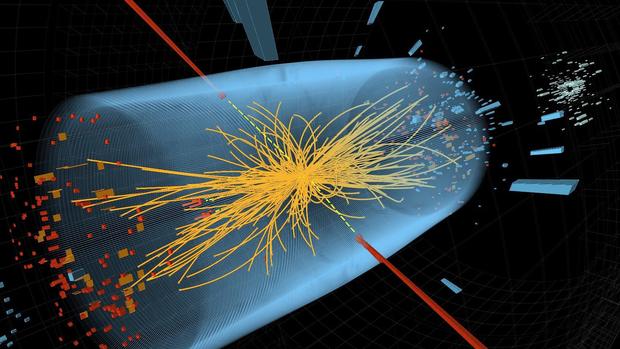Science world abuzz amid countdown to Higgs
The countdown has begun in advance of what some speculate may be one of the biggest announcements in the recent history of theoretical physics. We'll find out for sure in a few hours when scientists at the CERN laboratory in Geneva, offer an update on their search for the Higgs boson particle, which has sometimes been called the "God Particle."
The announcement is planned for 8 a.m. EDT (2 p.m. CET) at CERN, which is the home of the world's biggest particle accelerator, the 17-mile-long Large Hadron Collider. Researchers at the facility have been working on two experiments, called ATLAS and CMS. Although scientists have so far failed to confirm its existence, the Higgs boson is believed to give all other particles mass. Scientists at CERN have carried out experiments hoping that the explosions caused by high-speed collisions between protons inside the machine would actually create the Higgs.
Finding evidence of the Higgs boson would be an enormous scientific breakthrough for the physics world and would help explain why different particles have different masses. That is because the particle itself is thought to give mass to other particles, and thus to objects and creatures in the Universe.
"These results will be based on the analysis of considerably more data than those presented at the summer conferences, sufficient to make significant progress in the search for the Higgs boson, but not enough to make any conclusive statement on the existence or non-existence of the Higgs," CERN said in a statement.
Despite CERN's best attempt to take a low-key attitude, excitement surrounding this event has been building for weeks.
"Whatever happens eventually with the Higgs, I think we'll look back on this meeting and say, 'This was the beginning of something," said Joe Lykken, a theoretical physicist at Fermi National Accelerator Laboratory in Batavia, Ill., and a member of the CMS collaboration.
If scientists have found an indication of the Higgs, it could have far-reaching consequences in physics. It is the only particle predicted by the reigning theory of particle physics that has not yet been observed experimentally. Its discovery would help validate this theory, called the Standard Model, and fill in some of the remaining gaps in physicists' understanding of the smallest pieces of the universe.
